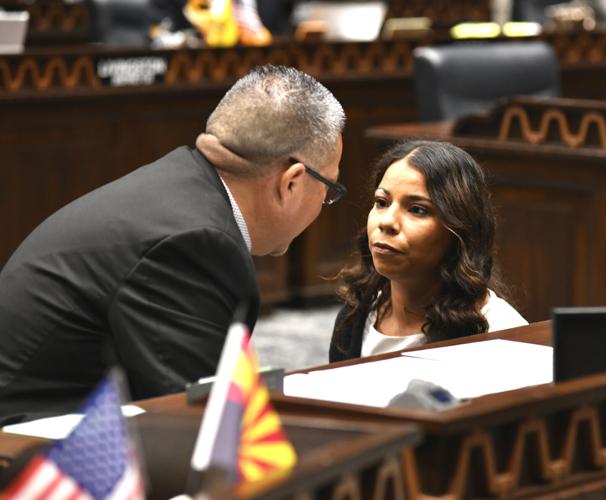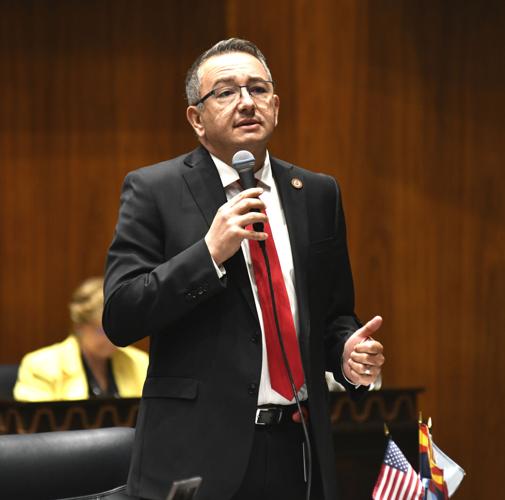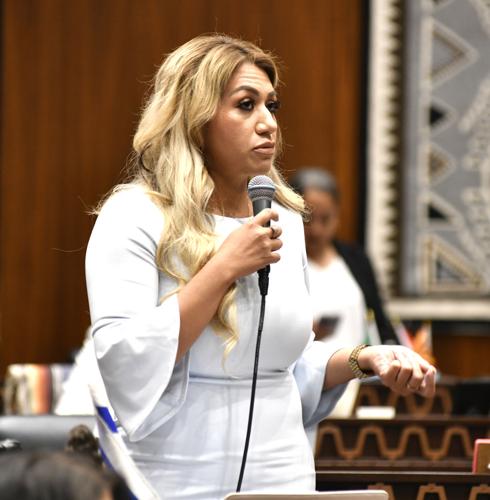PHOENIX — State lawmakers voted Tuesday to send a border security measure to the November ballot after debating the legality, costs and effects if it is approved by voters.
The 31-29 party-line vote in the Republican-controlled House followed two hours of lawmakers arguing the merits and pitfalls of enacting a law that would give the state a role in dealing with illegal immigration. Most notably, it would allow police to arrest those who enter Arizona from Mexico at other than an official port of entry.

Rep. Analise Ortiz consults with fellow Democrat, House Minority Leader Lupe Contreras, after Republican House Speaker Pro-tem Travis Grantham cut her off when she complained about the decision not to allow spectators in the House gallery.
There also are provisions dealing with enhanced penalties for those who provide fentanyl that ends up causing a death; and new requirements for governments to verify the legal status of those who seek public benefits.
“This vote will allow the people of Arizona to decide for themselves what they want,’’ argued House Majority Whip Teresa Martinez, a Casa Grande Republican. “Do they want a stronger border? Or do they want open borders?’
The House vote is the final action to refer the question to voters. The GOP-controlled Senate approved the measure last week; as a ballot measure it bypasses Democratic Gov. Katie Hobbs, who is opposed.
But LUCHA has scheduled a news conference Wednesday in front of the Arizona Supreme Court building to talk about litigation designed to keep the measure off the ballot.

House Speaker Ben Toma speaks to deny that a provision in a border security measure being sent to voters gives police immunity if they discriminate against people based on race.
A spokesman would not say exactly what legal claims the Latino rights organization intends to announce. But Rep. Oscar De Los Santos, D-Laveen, the assistant House minority leader, told colleagues Tuesday the measure as approved is illegal.
One of the issues goes to the multiple issues it is designed to address.
The Arizona Constitution says every law “shall embrace but one subject and matters properly connected therewith.’’ Instead, De Los Santos said, the bill has “a hodgepodge of subjects.’’
Supporters counter there is a single subject: border security. And while they acknowledge the penalties for fentanyl have nothing to do with immigration, they contend much of the flow of the drug comes from Mexico.
That drew derision from House Minority Leader Lupe Contreras, an Avondale Democrat.
“I don’t think the fentanyl pill’s going to have a stamp on it on the back that says ‘hecho in Mexico’,’’ she said.
There is also a constitutional amendment that says any ballot measure that proposes mandatory spending must also provide for a new source of dollars “sufficient to cover the entire immediate and future costs of the proposal.’’

House Majority Whip Teresa Martinez argues Tuesday that a measure being sent to the ballot will protect not only Arizonans but migrants themselves from being raped and abused by those who help them cross he border.
Legislative budget analysts studying the measure acknowledge there will be costs associated with arrests, prosecution and incarceration of those police arrest for crossing the border illegally. That includes an estimated $41 million in law enforcement costs and $16.6 million for incarceration in just the first six months.
Supporters don’t dispute that the proposal, HCR 2060, does not have a new tax to pick up the tab. Instead, they cite figures from the Federation for American Immigration Reform, which opposes illegal immigration, which put the cost of illegal immigration in Arizona at $3.2 billion.
But legislative budget analysts question some of the savings, pointing out that state agencies that provide health care and other benefits already verify the legal status of those who get certain benefits.
The debate at the House centered on whether state and local police should be authorized to arrest those who are crossing the border anywhere other than an official port of entry. A major question was whether it can be enforced in a race-neutral fashion.
The legislation says police could arrest someone only if they have “probable cause.’’ That includes actually witnessing someone entering the United States illegally or if having a recording of the event.
There is, however, also a catch-all provision to allow police to make an arrest if they have “any other constitutionally sufficient indicia of probable cause.’’ That is not defined in the legislation.
Rep. Patty Contreras, D-Phoenix, who was born in Yuma, said there is a history of racial profiling in Arizona.
She told colleagues of being taken with her seven siblings on road trips by her parents. On one of those trips, Contreras said, her father, John, was stopped by police in Quartzsite, about 100 miles north of the border.
“He was an American citizen, he was born in California, he was a Korean War veteran,’’ she said, noting he was also a businessman and a former vice mayor of Somerton where they were living, and an American Legion post commander.
“But these things didn’t matter to the officer,’’ Contreras continued. “What mattered to the officer was that there was a brown-skinned man driving a station wagon filled with a bunch of little brown kids.’’
Others, however, insisted the only thing the measure is designed to do is tighten up border security, especially in the face of what they say has been the Biden administration’s failure to enforce federal law, including existing statutes that make it a federal crime to enter this country at other than a port of entry.
“This is not about a race, or any race,’’ said Rep. Barbara Parker, R-Mesa. “This is about crime — the crime of crossing an international border when you are not allowed to do so.’’
And Rep. Lupe Diaz, R-Benson, said her point that this isn’t racially motivated is underlined by the fact that many people who have been crossing the border illegally — those this legislation seeks to allow police to arrest — are coming from 150 different countries around the world. Diaz said he’s read that includes people coming from “the-stan countries’’ like Kazakhstan.
“They look whiter than many of you in this room,’’ Diaz said.
But Rep. Cesar Aguilar, D-Phoenix, said the claims the legislation won’t be used for racial profiling ring hollow given that HCR 2060 also provides immunity to any state or local government entity or official from being sued civilly for enforcing any provision in the law.
House Speaker Ben Toma, who crafted the measure, said that misrepresents it.
“There is no immunity for police discrimination in the bill,’’ said the Peoria Republican.
He argued there are other safeguards.
For example, he said, police have to have “probable cause’’ to believe that someone entered the country at other than a port of entry. That, said Toma, is a higher standard than exists elsewhere where police need only “reasonable suspicion’’ to question someone.
He said that is where this measure is markedly different than SB 1070, the 2010 legislation that the U.S. Supreme Court partially struck down, which was designed to give police anywhere in Arizona the power to question those they believe are not in the country legally.
“This honestly cannot be referred to as the ‘show me your papers’ bill,’’ Toma said.
Rep. John Gillette, R-Kingman, chided Democratic colleagues for not going to the border on Monday when House Republican leaders arranged an early morning visit — between 1 and 4 am. — to see people coming through the border.
“You didn’t get to see the people you were talking about, standing on the other side of the fence that were released from a highway (in Mexico) and made it to the U.S. in less than 10 minutes,’’ he said. Those include people who are “brutalized, raped and trafficked,” Gillette said.
“Yet none of you came to see it, none of you wanted to see it, he said. “You had your talking points ready to go and didn’t want further investigation.’’
That drew a sharp response from several Democrats who said they do go to the border — regularly — at least in part because they have family on both sides, going back to the days when Arizona was actually part of Mexico.

Democratic Rep. Alma Hernandez argues Tuesday that a border security measure going to voters fails to account for the additional financial burden that would be placed on police, prosecutors and jails.
“Many of us who are sitting here have actually spent the majority of our lives crossing between Tucson and Nogales,’’ said Rep. Alma Hernandez, D-Tucson. “So I don’t need to go on a field trip and play dress-up and take videos when I’m literally there almost every weekend.’’
Parker said the bill isn’t about keeping people out but only ensuring that they come here legally.
“As a second-generation Italian immigrant, I love the stories my mother said of her parents and grandparents who came through a legal port at Ellis Island to work in the coal mines of Utah,’’ she said. “And her family taught her to obtain citizenship and learn English.’’
But Rep. Lorena Austin, D-Mesa, said what’s missing from that story is the historical perspective that the federal laws were designed to make sure “only certain people — white people — came to this country and had the opportunities afforded to them.’’ Austin said there were deportations of more than a million Mexicans in the 1930s, including citizens.
The entire debate got off to a rocky start after Toma ordered that no one be allowed in the House gallery to observe, claiming “security concerns prompted by the shameful and illegally disruptive conduct by Democrats and their leftist allies.’’
Members of LUCHA and other foes of the bill had staged a demonstration a week ago in the Senate gallery before being removed.
As to claimed conduct by Democrats, that apparently refers to shouting that occurred when House Republicans last month initially blocked a vote on repealing Arizona’s 1864 near total ban on abortion.
Ortiz on Tuesday accused Republicans of a double standard, saying they allowed “anti-abortion extremists to pack the gallery.’’
Get your morning recap of today's local news and read the full stories here: tucne.ws/morning







